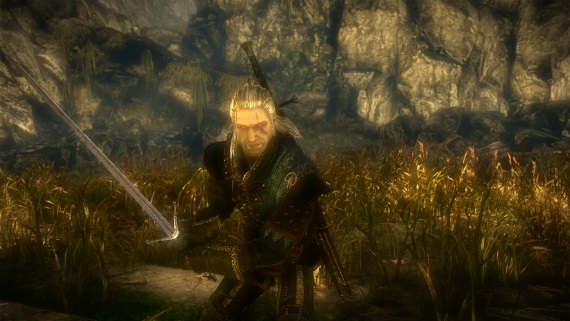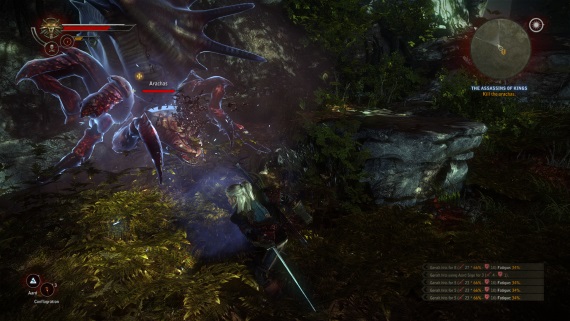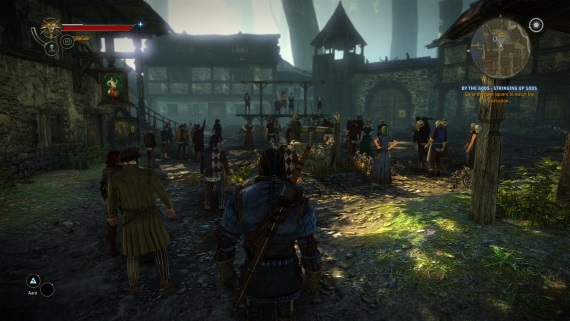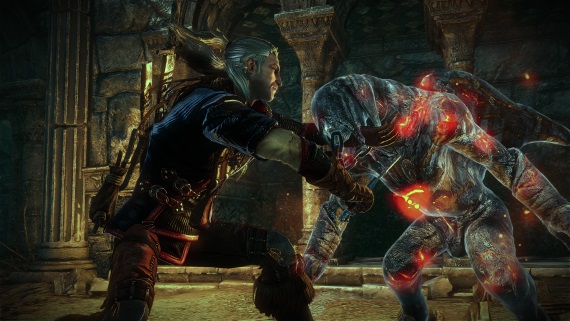18 May
Geralt of Rivia (who isn’t actually from Rivia) looks quite dapper for a witcher.
The first Witcher game was one of the most interesting RPGs of 2007. It also taught me that there was such a thing as non-English fantasy since the game is based on a fantasy book series by a Polish author. Here’s my take on the sequel.
- I spent something like 100 hours on this game so yes, I like it quite a bit. But that’s also because this game has an unusual structure. There are three main chapters and accounting for just these, the game actually feels quite short for an RPG. The odd thing is that you need to make choose one of two options at the end of chapter 1 and depending on what you pick, chapters 2 and 3 play almost completely differently. In my case, I played one option on hard difficulty and the other one on Dark Mode.
- Dark Mode is an additional difficulty level that was added in a patch. It’s the hardest non-Iron Man mode difficulty setting. It also adds a complete set of equipment for each chapter. Collecting the items require some farming but they are without the most powerful items in the game since the weapons have a unique lifestealing effect. Unfortunately to make Dark Mode cooler, the developers also made it so that drawing one of these special weapons causes the graphics to switch to black and white and shadows to appear at the edges of the screen. It’s an annoying effect and makes navigating dark areas, like underground caves, very troublesome.
- The first game was an oddball attempt to incorporate action-style gameplay within the Neverwinter Nights engine. It looked actioney but you could also queue up actions to perform. This one makes a full commitment to action-based gameplay. You can roll, attack, parry etc., all of the normal options available in a melee-based action game. The sword styles of the first game are out. Now you just have a fast attack and a slow attack. Combined with the Witcher signs and gadgets like throwing knives, bombs and traps, you have plenty of interesting options in fights.
As usual, monster slayers very often fight monsters that are much bigger than they are.
- Unfortunately, I’m not quite happy with their system and I think it’s down to the team’s relative inexperience with action games. Most modern action game are designed to be very responsive, because frustrated players are unhappy customers. They allow you to cancel out of actions, give you invincibility frames when rolling, etc. Witcher 2 doesn’t do that. In a sense, you could say that it’s like the Monster Hunter games. If you input an action, then you’re committed to seeing it through. But the control scheme in the Monster Hunter games feel deliberate and polished. The one here feels clunky and unfair. This is exacerbated by annoying design decisions. For example, the game thinks nothing of ending a cutscene with multiple enemies around you in melee range, so enemies get free hits even before you get control of your character. Parrying is annoying too because you take some damage while parrying and parrying consumes Vigor which is also used to cast Witcher signs, so you almost always want to dodge instead of parry.
- Despite some initial frustrations, I did eventually become good enough at combat to beat the game in Dark Mode more easily than I thought. But it’s because I learned to fight cheap, using rolls to kite enemies, using Igni as a unlimited ammo ranged attack, using Aard to stun single enemies for free hits, taking advange of Geralt’s acrobatics to jump in with a sword swipe and then quickly roll away. It works but it feels somewhat unsatisfying. Contrast this to how empowering fighting in the Batman games feels like for example.
- I very much like the tone and the general quality of the writing. I did need to look up key facts in the Witcher wiki though because you’re thrown in with little context. But I like how there are no good or bad choices in this game. It’s very much choosing what you want rather than what you think should be right. I also liked the richness and grim feel of the world. I like how, despite being fantasy world, it feels like an Eastern Europe fantasy world instead of a Western Europe fantasy world. It’s also really worth playing the game to twice to view all aspects of the events that occur. Another thing of note is that there is a lot of text in the Journal! The recounting of what is known in various quests and about the people you meet is very extensive, though I doubt that many players take the time to read all of the entries. One thing I did not like is how the final conversation in the game is one huge infodump. Surely there must be a better way to clear things up than having the main villain explain every aspect of his plan just before the final confrontation!
Walking into a busy scene with lots of characters present is quite a visual treat.
- I like the graphics too. It has a very busy, very organic feel. There aren’t that many different areas but the ones that you do see are nicely different including a military war camp. I also liked how the level designers made good use of the limited land areas they had to work with and were even able to fit in some semi-secret areas for explorers. Plus the animations are nicely improved compared to the first game.
- The optional activities, fistfighting, dice poker and arm wrestling aren’t really necessary. I particularly dislike the use of QTEs in fistfighting, not to mention some of the boss fights. The extensive crafting system is nice for those who like this sort of thing.
- For the curious, the romance cards from the first game are out, but there are plenty of cutscenes with naked women and plenty of sex scenes, not all of which involve Geralt. This is definitely one game that doesn’t care about its rating!
Despite all of my complaints, this is definitely a game that I like a lot and I’m looking forward to the next game, if only to see what happens next. Hopefully the team will get better at getting the controls right.
Just to show that this a real action game, we now have execution animations!
Written on May 18 2013 and is filed under PC Games.
You can follow any responses to this entry through the RSS 2.0 feed.
You can leave a response, or trackback from your own site.




Leave a Reply